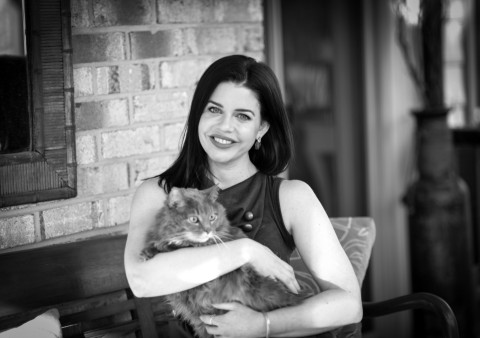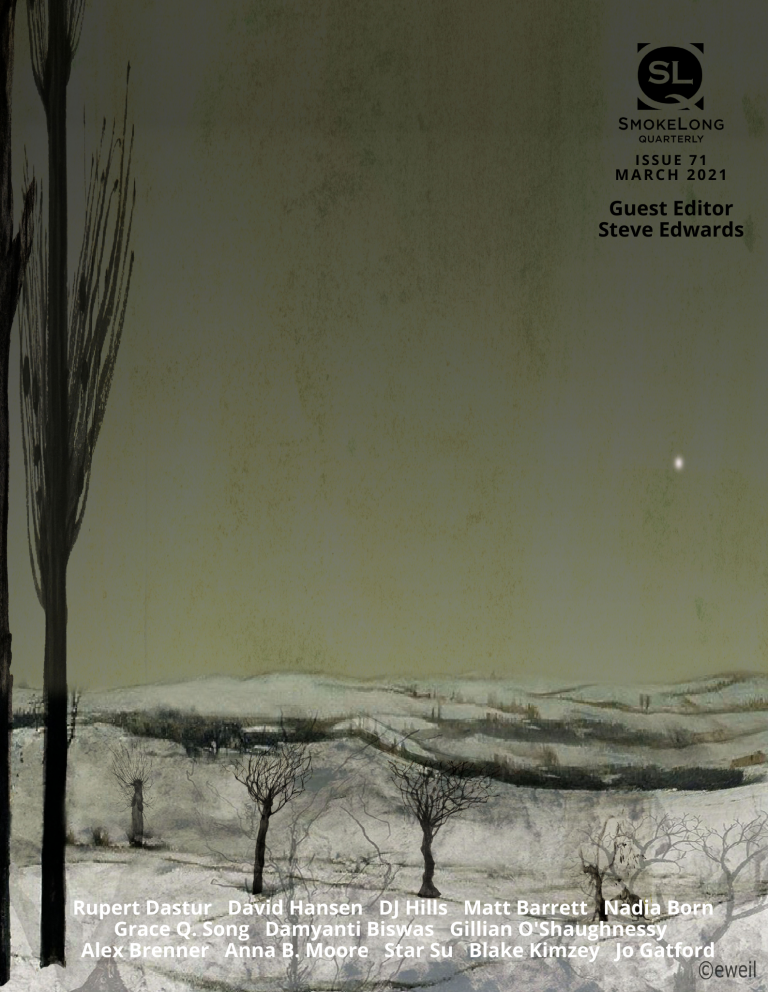The titular reference to snails plays out thrillingly throughout the piece. Those snails seem to capture the tension between a logical, ethical world and the injustice of this disease. When in the writing process did you land on this perfect, anchoring detail?
I came by it honestly after an evening in the ER. My mother was with me and she always tells the staff about all good things I’ve done. As a small child growing up in Florida, I was basically the snail messiah. I would carefully move hundreds of snails to safety from our walkways after the rain each afternoon. My mother shares this story in an attempt to barter with medical professionals, and I see what she’s doing. She tries to convince them that I’m too nice to be so sick, an unfortunate and common logical fallacy.
What I’ve learned from my condition is that many want to apply a notional economy to death. They want to live in a world where if you’re nice enough, young enough, or pretty enough, that somehow death won’t come looking. But illness, disability, and death have no economy. They’ll come, anyway.
This narrative covers a large swath of time, from childhood snails to a prophesied death. What’s your secret to stretching time while working in such a compressed form of flash?
Law school helped me hone this skill. Lawyers often have very little time to cover lengthy case history and precedent. I think the secret is precise language affixed to memorable details.
The narrator’s rare disease is central to this piece, and I know you’ve worked to educate others on this. Could you talk about how you use art to reach a reader on this subject, how that is similar or different from the advocacy and educating you do elsewhere?
Using art to reach the reader on my rare disease is a new undertaking for me. This is the first piece I’ve written about my condition. For the first year post-diagnosis, I didn’t feel comfortable admitting to myself, let alone others, just how bad things are. Internalized ableism made me feel ashamed for having a broken body, and I grew silent. With time, I’ve found acceptance. My goal with art is to make those experiencing disability, illness, and death feel accepted, too. In part, that’s why I leave the disease nameless in the story, so that this could be anyone’s hospital anthem.
When I advocate for my rare disease outside the artistic context, I tend to provide what is essentially a victim impact statement. I name my disease. I talk about how the disease damaged lots of important things in my body. I show people the upwards of twenty pills I take daily. I show them the experimental poison I inject into my thigh fat. I tell people about the brutal way it kills us, by collapsing our large and small airways, leaving many of us with tracheotomies, lest we suffocate to death. If not that, then the disease eats at the cartilage in our hearts till we croak. If we somehow survive all that, then there is our extremely high risk for rare, aggressive cancers. I want to make others look at me even if it’s uncomfortable. The more people who see us and care, the closer we will get to better medicinal therapies and, hopefully, a cure.
Can you discuss the relationship between “you” and “I” in this piece? What energy do you draw from the second-person direct address?
“You” is my mother. Originally, this was letter to her, which is why I used the direct address. I have goodbye letters written for my parents and a number of close friends should I pass. My mother and I are very close, but she struggles to accept my illnesses. She will always blame herself, though she shouldn’t. No one is at fault for my poor health.
I wrote this with hope it would free her of all that guilt. I know there will be sadness when I’m gone, but there can also be joy. I’ve had a good life and I’ve made the best of many difficult situations. I’ve figured out how to be happy in the dark, and not everyone can say that. I’m still a survivor even if I don’t survive this body.
With the pandemic, it’s a wonder any writer gets anything done. You’ve produced this gem during such a challenging time. What’s your process like in the pandemic? Has your writing been affected?
Pandemic writing has been a challenge. A few weeks after lockdown, my best friend of twenty years died suddenly. We never thought she’d go first, and so young. I never wanted her to be the one waiting for me on the other side. I wanted to wait for her. Courtney was only thirty-three, she’d just celebrated her birthday. I couldn’t be there with her at the end because of my health challenges. I helped pick her urn over video chat. I had to decide whether she would be an organ donor. These are the pandemic’s worst traumas. One of the most important people in my life was gone overnight and I still have no closure. I kept texting her for a month past her death, and I didn’t write anything for several months.
But ultimately I knew I had to keep moving forward. I started setting small goals for myself because Courtney wouldn’t want me to quit. With time, I was able to increase my writing goals and stick to a schedule. I’m happy to say that nearly a year later, I’ve completed the first draft of my first novel. She really loved the first few chapters, so I finished the story for her. I’d like to believe that wherever she is, she now knows the ending.



 The core workshop of SmokeLong Fitness is all in writing, so you can take part from anywhere at anytime. We are excited about creating a supportive, consistent and structured environment for flash writers to work on their craft in a community. We are thrilled and proud to say that our workshop participants have won, placed, or been listed in every major flash competition. Community works.
The core workshop of SmokeLong Fitness is all in writing, so you can take part from anywhere at anytime. We are excited about creating a supportive, consistent and structured environment for flash writers to work on their craft in a community. We are thrilled and proud to say that our workshop participants have won, placed, or been listed in every major flash competition. Community works.